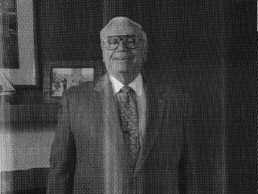

Ernest Borgnine, 33o, Grand Cross
Ladies and Gentlemen, and my Brethren, as you're listening to this videotape in beautiful Denver, Colorado, I am on the set of the television series The Single Guy. I would very much like to be there with you and have the opportunity to speak with each of you personally. Then, I could say "Thank you" for your special labors on behalf of our children with language ability disorders. I might refer to my work on the set of The Single Guy as "fortunate" because, in this stage of my career as an actor, I am grateful that I am still in demand. I've been blessed in having the opportunity to be a part of a television series that is worth watching by the entire family, something less common these days than should be the case. I can't remember a time when I have been more busy, nor do I remember a time when I have enjoyed myself more. I've truly been fortunate in my life and career.
I have also been singularly blessed at being chosen Honorary Chairman of the Scottish Rite Childhood Language Disorders Program in America. I get quite emotional when I think of what you are accomplishing in our centers, clinics, and programs across this great land. You are the hands that care and the voice with the warm expression of our great Scottish Rite philanthropy.

This photo and article are from a videotape of Ernest Borgnine addressing the first national Scottish Rite Clinic and Center Symposium in Denver, Colorado, October 20–21, 1996.
While my schedule prevents my being with you in Denver, I've been informed that your agenda almost guarantees that you will leave this symposium having equipped our wonderful charity to carry on its mission with far greater success. I want to pledge to you that we Scottish Rite Freemasons will double our efforts in raising the funds to make our laudable dreams and ambitions a reality. Perhaps I am more focused on speech than the average individual because speech has become my chosen craft. And when I survey all that our great Fraternity accomplishes, from the Blue Lodge through the York and Scottish Rites and the Shrine Temples of America, I realize that, for the most part, we express the tenets of our great Fraternity through rituals, proficiencies, obligations, and the conferral of Degrees.
All of this involves verbal expression. We are proud of our accomplishments and, therefore, better equipped to understand your pride in accomplishing the seemingly impossible. You actually touch a human life in a way that far surpasses entertainment or amusement. In an unparalleled manner, you change the destiny of a human being in a manner that transcends time. How proud we, too, are of your accomplishments. We understand very well the gratitude of parents who, for the first time in their lives, hear the intelligible voice of their child saying, "I love you."
Yes, I've heard of your hours of meetings, countless conferences, your many contributions to our Childhood Language Disorders Program. And I must tell you I am consistently overwhelmed that so many wonderful people are willing to give thousands of hours of their personal time to make life more pleasant for a child they may never meet again. You are champions of the principles upon which our great nation has been built.
You are perfect examples of what can be done when we are energized by love. You've chosen a large role in this drama called life, and you're playing it out upon the stage of human compassion with clarity, persuasiveness, and eloquence. Each of you is an Academy Award winner, and I'm proud, very proud, to be a part of your wonderful work.
One of the basic principles of our Fraternity is love. We hear that word within a few moments of entering a Lodge for the first time. Love, as we know it in our Fraternity, does not necessarily mean that we have a warm affection for an individual, so much as we are dedicated by our Masonic obligations to take care of that individual and to provide for that individual's well-being, health, and welfare.
I'm reminded of a story of a little boy and his sister. The little girl had contracted a serious disease that threatened not only her health but her life. According to the story, a kindly physician suggested that the only chance for her to survive the illness was to have a blood transfusion from someone of the same blood type.
Now, in the rural setting of this story, the only available donor was her brother, age nine. The boy was told of the seriousness of the situation, and the doctor explained to him that he would lie on the kitchen table, next to his sister, and have a needle inserted into his arm. Then a portion of his blood would flow to his little sister so that she might have an opportunity to live.
The little boy choked back a tear to hide his apprehension and agreed to the transfusion. According to the story, as the transfusion began to take place and the blood began to flow from the little boy's veins to the sick body of his little sister, the little boy began to perspire. While his mother held the hand of his sister, the father stepped to the side of his son, slipped his son's tiny hand into his own and, noting the perspiration and fear in the little fellow's eyes, said:
"Are you okay, son?"
"Yeah, I'm fine," he responded.
"Are you afraid?"
"A little."
Silence fell over the room as the physician attended to the transfusion, and finally the little boy's eyes turned to his father, and in a tiny voice, he asked the simple question: "Daddy, how long before I die?"
Never having heard of a transfusion, he had mistakenly believed that by giving a transfusion of life he would lose his own. And yet at age nine he was willing to do it. Perhaps, that expresses a true meaning of love, a meaning that transcends not merely contributing time, money, effort, and talent; a meaning that goes beyond simply choosing a career destined to make someone happy or whole.
We are in a position to give a transfusion of life to little children, children who are silent or unintelligible in their sounds, children who are limited in their vocabulary or ability to express themselves. These children are tiny future adults: mothers, fathers, teachers, doctors, lawyers, politicians. Their minds are filled with dreams they cannot express, visions they cannot explain, ideas they cannot articulate. These children will soon grow up in a foreign world of garbled sound and faulted communication unless we're willing to give them a transfusion of life—the aid for which we, as Masons, are so well-known.
We must not be too busy congratulating ourselves. We must guard against putting our shoulder out of place by patting ourselves on the back. We must guard against selfishness or any hint of an ulterior motive in dispensing this transfusion called love. We must, also, not allow ourselves to be limited by what has been done in the past, nor constrained by that which seems easiest, nor stunted by lack of imagination.
Let us, instead, set our eyes upon the horizon, dream dreams, see visions, and make those visions become reality. And you, you wonderful people, are making it all happen.